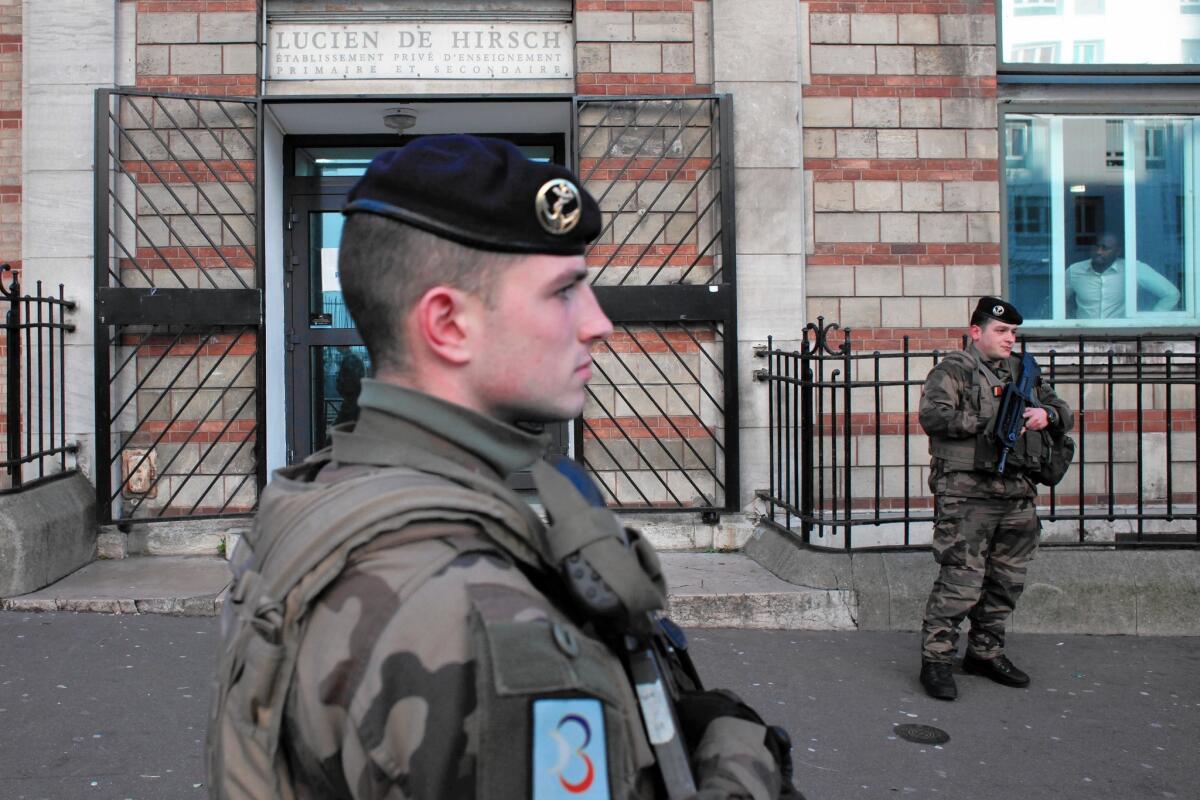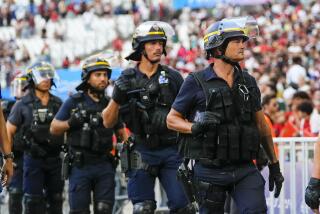How France missed a homegrown terrorism plot

- Share via
Reporting from Paris — On the streets of Gennevilliers, a working-class suburb north of Paris, residents said there was little indication that a militant bent on warfare on French soil was living in their midst.
“He came once a week to pray and minded his own business,” Ali Harez, secretary at the Ennour mosque, said of Cherif Kouachi, who lived in a rented flat a few blocks away. “I can understand how the police didn’t know either.”
In the last year or so, according to government and news reports in France, authorities dropped surveillance on Kouachi and his older brother Said, concluding that the siblings posed no imminent threat, despite past associations with militant Islamists and an intelligence report that one brother had traveled to Yemen to train with an Al Qaeda affiliate.
On Friday, law enforcement authorities in France, Belgium and Germany trumpeted the arrests of more than two dozen people in a sweeping crackdown on suspected militant rings, none necessarily linked. But for at least some in France, it felt as though the action had come too late.
In retrospect, the decision to end surveillance of the Kouachis was disastrous: The brothers carried out the well-planned assault that killed 12 people at the Paris offices of Charlie Hebdo, a satirical magazine long in militant crosshairs because of its mocking of Islam. Their apparent accomplice, Amedy Coulibaly, killed a police officer and four people at a kosher grocery.
The three assailants were killed Jan. 9 in shootouts with police.
Authorities and acquaintances say the three men appear to have successfully concealed their intentions despite well known past connections to militant networks.
Coulibaly also went off the official radar soon after his release from custody last year for his part in a plot to spring a jailed extremist convicted in connection with a series of train bombings in 1995.
Shaken French authorities have been at a loss to explain what seems to have been a massive intelligence breakdown.
A nation with a sophisticated surveillance infrastructure, decades of experience investigating Islamic extremists and a vast network of informants somehow missed a homegrown plot by French-born men of immigrant ancestries. French prisons appear to have been an extremist incubation ground for at least two of the men, prompting calls to isolate known militants who are behind bars.
French Prime Minister Manuel Valls acknowledged that there had been “clear failings” in intelligence and vowed an overhaul of anti-terrorism procedures.
“We must respond to this exceptional situation with exceptional measures,” Valls told the National Assembly this week.
There is talk of a French version of the United States’ Patriot Act, enacted after the Sept. 11, 2001, attacks. The measure has been hailed by some prosecutors as an effective anti-terrorism tool, but has drawn the ire of civil libertarians. There is deep resistance in France to any move to expand police searches, surveillance, large-scale official data gathering and other potentially intrusive actions.
“I think what is going on in Paris right now is a deep introspection about how do they deal with the constraints,” said Andrew Liepman, a senior policy analyst at Rand Corp. and former principal deputy director of the National Counterterrorism Center. “How do they give their domestic intelligence and law enforcement communities a bit more leeway?”
Since last week’s attacks, the French have bolstered police presence on the streets, deployed thousands of troops and conducted a series of high-profile anti-terrorism sweeps in a bid to both allay public concern and wipe out remnants of the cell whose acts stunned the continent.
But experts say the now much-criticized French move to end surveillance on the Kouachi brothers appears to have been standard operating procedure, given the suspects’ recent apparent turn toward moderation and the many demands facing beleaguered French investigators. Experts say the system, from street agents to analysts to magistrates, is inundated.
“The problem was essentially a problem of resources,” said Jean-Charles Brisard, chairman of the Paris-based Center for Analysis of Terrorism. “Indeed, today our services globally are totally overwhelmed.”
France, home to Europe’s largest Muslim population, was already facing myriad militant threats from both potential “lone-wolf” attackers and organized cells before the outbreak of the Syrian war brought calls for action across the Middle East, Europe and elsewhere. Hundreds of French nationals have left to take up arms in Syria, spurring the creation of new radicalized networks and posing a severe potential security threat. Keeping track of it all is a massive undertaking.
“This is a very new problem for us, as it is for many countries in Europe,” Brisard said. “We cannot put surveillance on everyone.”
Placing a person under round-the-clock surveillance may take 20 to 30 agents, he said.
Anti-terrorism authorities worldwide operate on a kind of triage concept, focusing their efforts on suspects who appear to present the greatest threat at a given moment. The system is subjective and far from foolproof, with lists of suspects constantly shifting.
Cherif Kouachi, previously jailed for being part of a Paris network that sent volunteers to fight U.S. forces in Iraq, seemed to be moving into less sinister pursuits, reportedly including trafficking in counterfeit clothing and shoes. His older brother had no known criminal record. Coulibaly had been a model prisoner and had stayed out of trouble since being released from jail last year, authorities said.
As a result of last week’s violence, authorities see a calculated attempt by determined and devoted killers to reduce suspicion and throw off harried French law enforcement authorities.
“We were dealing with people who knew they were being watched and knew how to avoid it,” said Christophe Crepin, a police union official in Paris and a former police officer. “They understand our system and how to exploit it. These guys were calm, determined, coldblooded.”
A major open question is whether the attackers were acting at the direction of outside extremist organizations such as Al Qaeda or Islamic State.
On Wednesday, the Yemen-based Al Qaeda in the Arabian Peninsula, considered among the most potent Al Qaeda franchises, claimed responsibility for the assault on Charlie Hebdo. But some have voiced doubts, noting that the attack happened 21/2 years after any publicly known links between either of the brothers and Al Qaeda. Likewise, many are skeptical of Coulibaly’s assertions in a video posted online posthumously that he had pledged allegiance to Islamic State, a fierce rival of Al Qaeda.
U.S. intelligence officials have confirmed that at least one of the brothers traveled to Yemen in summer 2011, received training from Al Qaeda in the Arabian Peninsula and returned with about $20,000 in cash provided by the terrorist group. News reports have indicated that both brothers may have ventured to Yemen.
So far, U.S. intelligence officials have not found signs of communication between the Kouachi brothers and Al Qaeda after September 2011, when Anwar Awlaki, the U.S.-born cleric and Al Qaeda recruiter, was killed in a U.S. drone strike in Yemen.
With the death of Awlaki, the brothers may have lost their link to Al Qaeda’s Yemen affiliate, U.S. analysts have theorized. Another possibility is that the brothers decided on their own to cut off communication with Al Qaeda as a security measure. No information has emerged publicly indicating that the plotters had recent access to large amounts of funding from abroad.
French media reports indicate that the funding for the heavy arms used in last week’s attacks may have come from a loan of about $7,000 that Coulibaly took out Dec. 4 from a French financial services firm, Cofidis. Belgian news reports have said Coulibaly may have purchased the weapons from a Brussels arms dealer who has since turned himself in to police.
The picture so far suggests that the attackers may have been inspired by outside militant groups, but devised their plan of attack on their own, in clandestine fashion, as they appeared to live normal lives in the European nation where all three were born.
McDonnell and Hennessy-Fiske reported from Paris and Zavis from Los Angeles. Times staff writer Brian Bennett in Washington contributed to this report.
More to Read
Sign up for Essential California
The most important California stories and recommendations in your inbox every morning.
You may occasionally receive promotional content from the Los Angeles Times.












